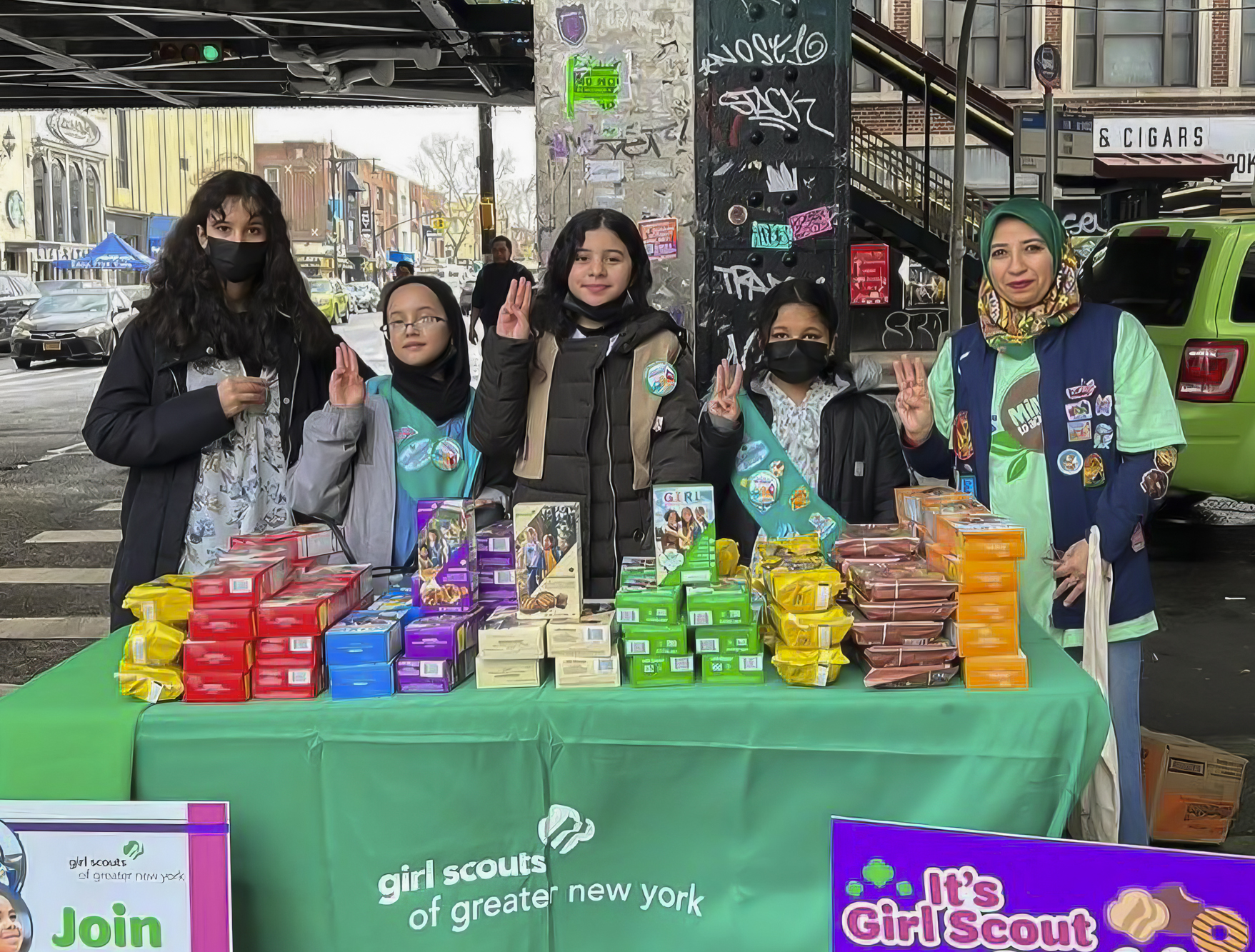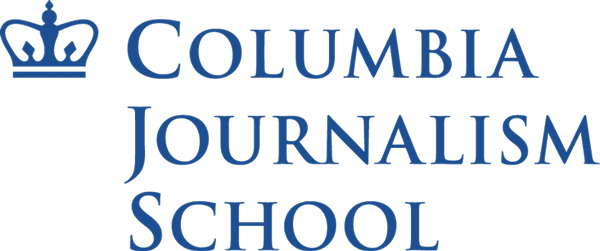
Rayan assists members of the Muslim Girl Scouts of Astoria in annual cookie sales. (Credit: Photo courtesy of The Muslim Girl Scouts of Astoria, Instagram).
Amira Ismail and her mother, Abier Rayan, had a busy day ahead of them.
Late last June, the mother-daughter duo were celebrating the first day of Eid al-Adha at the Neptune Diner in Astoria, Queens. Twenty people, including their family and friends, joined them to commemorate one of the most important holidays for Muslims. But later that evening, Ismail and Rayan were celebrating an accomplishment that had taken years of preparation and commitment from both of them – they were attending the 2023 Girl Scouts Gold Award Ceremony & Scholarship Presentation.
After dinner, Ismail quickly replaced her Eid attire, black dress pants, and a salmon–colored blouse, with her Girl Scout uniform: khaki pants, a beige vest filled with colorful badges and a matching hijab. Rayan wore a flowing white and navy skirt.
When they arrived at The Great Hall at Cooper Union College in Manhattan, the auditorium was filled with around 50 other Girl Scouts who had won Gold Awards, their families and their mentors. The elaborate auditorium, with its white columns and rows of beige ceiling arches, added an element of grandeur to the celebration.
Ismail, 17, was a bundle of nerves.
“It was a moment that was building for three and a half years. It felt very surreal,” Ismail said.
This was the first time girls from the Muslim Girl Scouts of Astoria had won a Gold Award – the highest award in Girl Scouts. These projects required 80-plus hours of commitment to address the needs of their communities.
When it was Ismail’s turn to receive her award on stage, Rayan beamed as she handed Ismail a certificate and placed a gold sash around her neck. Ismail gifted her mother and mentor with a bouquet of golden-colored flowers. The crowd erupted in cheers as the pair posed for a photo.
The duo’s recent strides in increasing their ties with the local community and making structural changes within their own organization have been the product of deep commitment. They aim to foster a safe and fun space for young Muslim American girls. For the duo, the most significant challenge ahead is keeping the Muslim Girl Scouts of Astoria sustainable for future generations.
“We started with 10 girls in 2006. Today we have 80,” Rayan said.
Although the Girl Scouts of Greater New York does not track religious troops and their locations, Rayan estimates that there are seven or so other Muslim Girl Scout troops based in the region. The Girl Scouts of Greater New York could not confirm this number. Other religious Girl Scout groups in New York City include Jewish and Catholic troops.
Like all Girl Scouts, members of the Astoria troops vote each year on the badges they want to pursue. In addition to typical badges that focus on things like women’s health, nature and STEM, the troop can earn a special badge that reads, “I discovered Girl Scouts with my Muslim sisters.” They acquire this badge through a series of gift and letter exchanges.
The religious and cultural distinction of the Muslim Girl Scouts is vital, according to Rayan and Ismail. It allows young Muslim girls to partake in a quintessentially American coming-of-age experience while maintaining their shared Muslim faith and identity. Essentially, members of the Muslim Girl Scouts share in all the activities that non-Muslim Girl Scouts do – the main difference is they center major events around Muslim holidays, like Ramadan and Eid.
“The Muslim Girl Scouts provides a safe space where we can talk about women’s issues and what’s taboo in different cultural settings,” Ismail said, pointing out the need for such spaces, especially for girls and women of color.
The organization additionally bridges the gap between American lifestyle with Muslim values. Traditionally, Muslim parents don’t allow children to have any sleepovers, but through the Muslim Girls Scouts of Astoria, parents make an exception. They allow their girls to go on overnight camping trips at Camp Kaufmann in upstate New York.
Lately, the organization has focused on connecting with larger communities.
Within Astoria, the Muslim Girl Scouts collaborated in an event with Little Amal, a giant puppet of a young Syrian refugee girl that spread awareness around the world of the Syrian refugee crisis. Last September, Rayan and Ismail facilitated Little Amal’s welcome in Astoria Park, guiding her with handmade lanterns. More than 150 registered attendees joined the walk including Astoria residents and other New York City Girl Scouts.
Ismail’s Gold Project, called “Make U Listen,” expanded the scouts’ services beyond Astoria, offering engagement with 30 students across New York City and Long Island. It consisted of three days of Zoom sessions that provided informative workshops on electoral politics and civic education. Ismail taught participants vocabulary terms used in campaign environments, communication skills as potential volunteers on campaigns, and fundamental facts about U.S. and local government.
Because of Rayan’s organizational and community impact, local elected officials have also recognized her.
Just two months before the Gold Awards, Rayan was honored at City Hall as part of its Eid al-Fitr celebration. On April 25, Council Member Tiffany Cabán awarded Rayan with a proclamation for 17 years of dedication to more than 200 girls at the Muslim Girl Scouts of Astoria.
“Abier embodied the vision that Council Member Cabán has for public safety. What we mean by public safety is it’s about creating and strengthening spaces for people to grow and thrive from one another,” said Yousof Abdelreheem, 22, who was part of Caban’s constituent services team last year. Abdelreheem witnessed Rayan’s influence firsthand as the brother of two sisters who were in her troop.
When Rayan arrived at City Hall, she was surprised to be the only person in Astoria receiving the proclamation.
“When she told me that, I was like ‘Dude what?’ I was super proud of her,” Ismail said.
Volunteering for the Muslim Girl Scouts of Astoria started out as a fun outlet for Rayan, who struggled when she emigrated in 2000 from Dubai to the city.
“I stayed in my own bubble for about three years,” Rayan said.
Rayan, 48, was a lab technician in Dubai, but when she arrived in New York City with her husband and elder daughter, Noor, her dreams of pursuing a master’s degree became too expensive. Time became a luxury after giving birth to her son Bassm, and a few years later, Amira.
“I didn’t have any friends or an Arab community for a while. It was me and NY1. NY1 taught me a lot about the city,” Rayan said.
However, everything changed for Rayan in 2006, the year the Muslim Girl Scouts of Astoria was founded. Rayan had made a friend at Noor’s public school, bonding over their Egyptian heritage. Her friend took her to the mosque in Astoria where the troop held meetings, and Rayan started her journey with the scouts, volunteering as a troop leader. Noor signed up, and Ismail joined when she was 3 years-old.
In 2014, Rayan took over voluntarily managing all the troops of the Muslim Girl Scouts of Astoria and was hired by the Girl Scouts of Greater New York in a separate role in Manhattan.
Ever since the founders passed down leadership to Rayan, Maryam Shuaib, 21, noticed a fix to a significant problem she identified within the organization, followed by a programming shift. Shuaib is a current troop leader and a previous Muslim Girl Scout who was under Rayan’s guidance.
Rayan recruited Shuaib in 2022 after Rayan noticed a growing consensus among the girls that they wanted younger troop leaders. For Shuaib, with little relatability between many of the girls and their mostly middle-aged leaders, much of the programming previously left a lot to be desired.
“There were too many activities tailored to arts and crafts. I decided my first year as a leader I would center my programming around human rights and faith and gender identity-based activities,” Shuaib said. In the past several months, she has led multiple Know Your Rights workshops to prepare the girls who might be attending pro-Palestinian protests.
Shuaib, who is Palestinian, says the Muslim Girl Scouts is the only community where she feels safe to talk about the war in Gaza and how it is impacting Muslim American students. As the Student Body President at St. Francis College in Brooklyn, Shuaib has experienced levels of censorship unlike anything she’s ever encountered – from discussing the topic of the war in her politics classes, to releasing a public social media statement representing perspectives of the student body, she said.
“I like to keep the Girl Scout space as an oasis where we can have constructive conversations,” Shuaib said. “Abier and Amira have been in full support of that.” She says that finding a balance between helping the girls destress, while preparing them for what they might encounter outside of the Girl Scouts, has been difficult to navigate.
Since Rayan took over, she has recruited five troop leaders in their 20s. Previously there were none.
Although Rayan is not thinking about retiring any time soon, she has faith that the troop leaders that she trains will be capable of helping their Girl Scouts face the rising uncertainties in their lives.
Reserving a free space for the organization to accommodate the group’s growing size has been a reoccurring logistical issue; the local mosques can no longer accommodate them. Last year, the scouts moved their meetings to the Queens Public Library on Ditmars—Steinway, but when the library started construction work, Rayan had to quickly pivot, and reserve a space at the Queens Community Center in Astoria.
Moving the Muslim Girl Scouts out of Astoria would be less than ideal to Ismail, who notes that there is a particularly strong Arab hub of small businesses and immigrant advocacy centers in this Queens neighborhood.
With most Girl-Scout-related matters, Rayan and Ismail see eye to eye. But there is one case where they are on opposing sides, and that is related to the Girls Scouts’ famous cookies.
“Samoas, they are coconut and chocolate. They are number one – no one can debate!” Rayan said. Ismail favors Thin Mints, the competing bestseller.
“I’m a debater, don’t even say that!” Ismail said.



